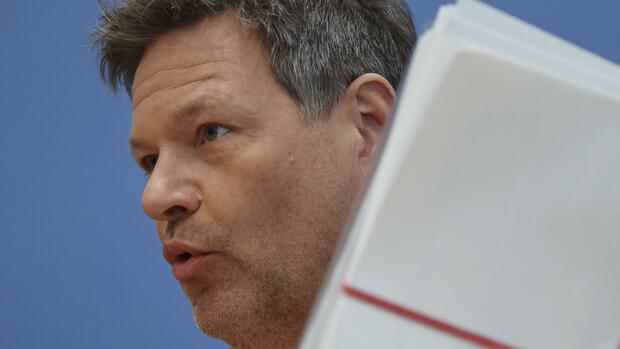With the Ukraine war, the acceleration of the expansion of renewable energies has gained additional relevance.
(Photo: Reuters)
The “Easter package” from the Ministry of Economics has it all. It comprises more than 500 pages, five laws and a number of ordinances are amended. More is not possible. Federal Minister of Economics Robert Habeck (Greens) wants to ensure that the expansion of renewable energies is accelerated as quickly as possible. The aim is for at least 80 percent of gross German electricity consumption to come from renewable sources by 2030, and by 2035 it should be almost 100 percent.
With the war in Ukraine, the project that Habeck had announced right at the beginning of his term of office and thus before the start of the war, gained additional relevance: electricity from renewable sources has now become the “energy of liberty”.
If Russia fails completely as a supplier of energy raw materials in the medium or even short term, the importance of each individual wind turbine increases. Of course, regardless of the Ukraine war, it is right to accelerate the expansion of renewables. They consistently failed to achieve the goals that politicians had set themselves.
But doesn’t the Easter package raise false expectations? With the package, the traffic light coalition is removing many hurdles that have been completely unnecessary in the way of renewables, especially wind energy, for years. Every line of the package reflects the firm will to take the expansion of renewables to a whole new level.
Top jobs of the day
Find the best jobs now and
be notified by email.
This culminates in the determination that the use of renewable energies is in the overriding public interest and serves public safety. In this way, renewable energies are to be given priority when weighing protection interests. Pinwheel or Red Kite? In the future, the answer to this question will in most cases be in favor of the wind turbine.
The expansion targets are also breathtaking: ten gigawatts (GW) of installed onshore wind power capacity are to be built every year in the future. This value was never reached even at the very best times of wind power.
The weak point of the new regulations: good will alone will not be enough. Resistance to the construction of wind farms and power lines is not easy to break. It may turn out to be even more bitter, the more resolutely the expansion is pushed ahead. When it came to expanding the network, those responsible had to recognize that the restrictions on the right to participate and object are reaching the limits set by the Basic Law and European law.
The “Easter package” leaves many questions unanswered
It will be interesting to see what the Federal Ministry of Economics will come up with in the coming weeks in order to achieve the goal of the coalition agreement of making two percent of the state area available for wind power. Are all federal states sheared over the same comb? Or shouldn’t countries with high wind potential be treated differently than countries in the south, which tend to have little wind? What about the distance rules? How close can a wind farm be to the residential area? How many wind farms can forests and landscape protection areas tolerate?
The Easter package leaves all of these questions unanswered; they will become part of the next legislative initiative that will determine the success or failure of the Easter package. The ambitious expansion goals alone are of little use if there is a lack of appropriate space, acceptance and constructive cooperation on the part of the federal states.
In addition, one should give up for a moment the idea that the expansion of renewables is the only goal of the energy transition. A few months ago, when people in Germany still thought that Russian gas would be a stable bridge for the transition to the age of full supply with renewables, there was still a debate about how many new gas-fired power plants will be required as a backup for the renewables. The majority of experts still consider it essential to build new gas-fired power plants. It is completely unclear who should make these investments in view of the extreme uncertainties on the gas markets and the still unresolved procurement problems.
The signs for the energy transition have deteriorated significantly. Everyone wants a complete changeover, and as soon as possible. But no one knows how the transition phase, which will take many years to come, will be shaped. In any case, the accelerated expansion of renewables is only part of the solution.
More: Despite Putin’s threat, gas is still flowing into Germany
